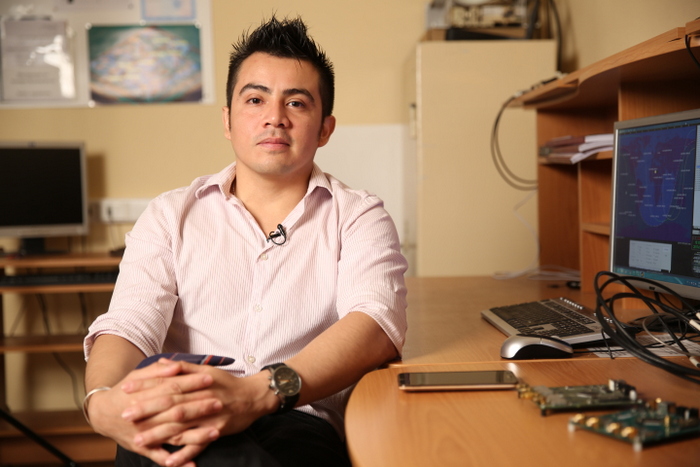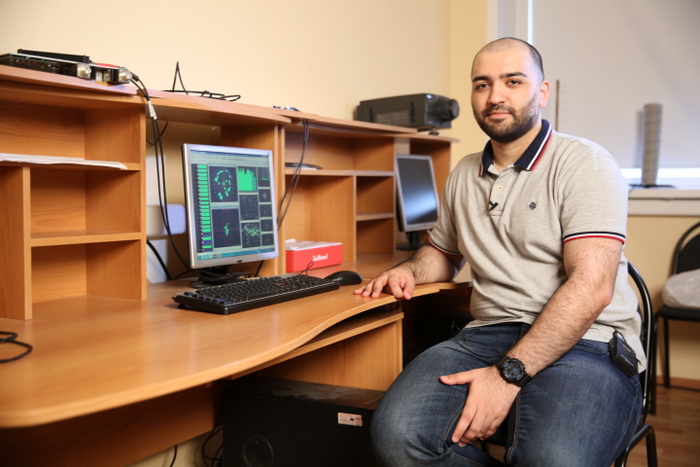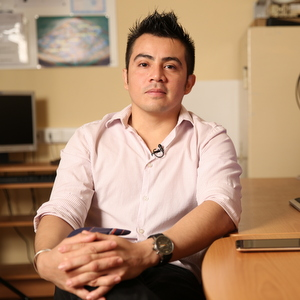The graduates of the first master programme in English in GNSS sphere at Samara University shared their impressions of the studies and received experience.
Sergio Braga from Mexico changed professional plans after studying at Samara National Research University: “Before applying here for the programme “Applied Mathematics and Physics” (Algorithms of positioning and application of global navigation satellite systems) I planned to enter the same direction in my country. But now after completing the education at Samara University I am able to go and work in Europe”.


Behzad Far Shervin from Iran learnt programme “Radio engineering” (GNSS receivers. Hardware and software). “The most precious in the studies was getting acquainted with the latest technologies in the sphere of radio electronics and satellite navigation and receiving of a huge amount of knowledge in the sphere of space technologies. I am sure that I will be able to apply it in practice”, - Behzad Far Shervin described his key achievements.


Students from different corners of the world study at master programmes in GNSS sphere at Samara University, but there is one common trait that units them: everyone is sure that satellite navigation has a great potential for development, great perspectives and studies at Samara University can help their realization in this sphere.
In fact, in the modern world it is difficult to find a sphere which can do without satellite navigation. The most actual technologies of GNSS in the transport field are land transport, aviation, sea and river shipping. Satellite systems are irreplaceable in space and personal navigation. Neither military men, nor traders, nor specialists in the sphere of telecommunications can do without them. Satellite navigation is widely used in geodesy and mapping, town and land cadaster, land inventory, construction, geology, agriculture, study of seismic processes.
The master programme participants are searching for their places in the world. Behzad Far Shervin concentrated on the enhancement of the navigation precision. He developed a programme code in MatLab for GPS receiver which works with signals L2C in his research. Using it with this new range of frequencies L1 usual civil receivers get the precision of positioning comparable with the military equipment.
Sergio Braga chose the sphere useful in meteorology. His master thesis is devoted to the way of making calculations and prognosis of the air humidity change with the help of the data received from navigation satellites.
Study in Russia at Samara University is regarded by the masters as a unique chance to get deep and varied knowledge in the sphere of GNSS, though they do not conceal the fact that this is a certain challenge as well.
“At first it was very difficult for me as I have grown up in other latitude, - Behzad Far Shervin told how Samara welcomed him. – In the first year of study the summer was very hot and the winter was unusually cold and long. It was very difficult to adapt, but I got used to it. And, of course, the most beautiful thing that I have seen and loved in Samara is the Volga. In my childhood I have often heard the Russian folk song about the Volga, barge haulers (The "Song of the Volga Boatmen" [Ey, ukhnem! - "Эй, ухнем!"] – editor’s comment). It stuck in my mind firmly and at last I saw this river with my own eyes…”
“To go and study at Samara University one must be a very open person, ready for changes, risk, able to leave the zone of comfort. And one must know at least the basis of the Russian language. – Sergio Braga added. – I am glad that I have chosen Samara. All Russia is wonderful and interesting, but it seems to me that you have more Russian language here than in the capital. First of all, it is so because here there are few foreigners. I like it, it was an additional stimulus for the study of the Russian language. Of course, at university I spoke English, but in usual social life, in communication with friends one cannot do without Russian”. Despite the adaptation difficulties the participants of the master programme are glad that they have chosen Samara University because the knowledge and practical skills got by the students in university laboratory allow them to continue their careers in the chosen field.
Evaluating their study at master programme Behzad Far Shervin drew attention to the strong theoretical training and lectures of Prof. Kai Borre from Aalborg University (Denmark). He is leading at Samara University master programme in English “Navigation receivers. Hardware and software” and manages the laboratory in this field. “Lectures by Kai Borre gave me new knowledge in the sphere of GNSS. I cannot but mention the courses on digital signal processing, theory of receivers, FPLDs which were very useful and filled in many gaps. The volume of the received information was so huge that the most difficult in the studies was the term for writing master’s thesis, - when I had to realize in the working projects the whole bulk of the received knowledge. I am grateful to our lecturers, scientific advisors and PhD students for the help in writing this work”.
Other directions were more useful for Sergio Braga. “Very interesting were lectures on aerodynamics in space, satellites in space as well as lectures on applied mathematics and physics in the sphere of GNSS because the sphere of my scientific research includes the use of a huge amount of mathematical formulae for processing of the results. The most difficult for me turned out to be programming, very often my groupmates and lecturers helped me to make sense out of it. We communicated very much, they spent their time on me and explained thoroughly how and what to do”, - Sergio Braga made the point.
Human-centered approach and professional tutoring was also appreciated by Behzad Far Shervin: “In my opinion Samara University stands out because of its openness and interest in the result. Professors are always ready for communication, any questions, suggestions and even critique. For me as a foreigner this is very important. I know that I can come with my questions and get a solution or at least the right direction in which I should work”.
A doubtless advantage of the master programme in the sphere of GNSS its participants consider the lecturing in English. Knowing that such a complex and deep material was covered in this time they are united in their opinion that to study in Russian would have been very difficult.
Despite the fact the master programme is only for two years, the students feel that they have become a part of the university and are proud for it and its history. “For me the connecting link at Samara University is the aerospace sphere, pride for feeling its beginning, developing different space technologies and devices and creation of its history today. – Sergio Braga summed up. – I witnessed how small children come for excursion to the Space and Aviation Museum of Samara University. The students absorb love to space and go to study at university gladly. In my opinion, it is very important not only for university, but for all citizens of Samara as well – pride for the big contribution in the world space achievements and developments”.
 RU
RU  EN
EN  CN
CN  ES
ES 